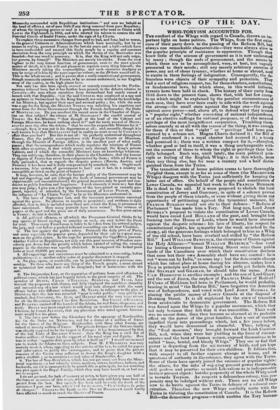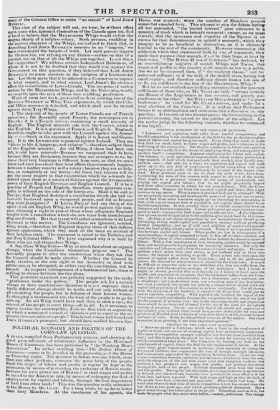TOPICS OF THE DAY.
WHIG-TORYISM ACCOUNTED FOR.
THE conduct of the Whigs with regard to Canada, throws an portant light on home politics. The Whigs, from the first exist- ence of their party down to the passing of the Reform Bill, bed always one remarkable characteristic—they were always alive se the popular principle of resistance to oppression. Though they know little of the science of government as it is now understood by .many ; though the ends of government, and the means by which these are to be accomplished, were, at best, but vaguely presented to their minds; still any merely arbitrary exercise or power, any act of sheer tyranny, whether at home or abroad, used to excite in them feelings of indignation. Consequently, the de- fenceless were objects of their sympathy and protection. They had a sort of religious respect, too, for those charters, constitutions or fundamental laws, by which alone, in this world hitherto, tyrants have been held in check. The history of their party frets 1688 down to the present time, shows that, with but few excep. titan which might be explained by the peculiar circumstances of each case, they have ever been ready to side with the weak against the strong—the small state against the large one—the people against mere power—and, above all, to defend what they termed a " popular right," whether consisting of national independence, or of an elective suffrage for national purposes, or of the meanest privilege of the most insignificant corporation. Troubling them- selves scarcely at at all with the reason of the thing, it was enough for them if this or that " right " or " privilege" had been gua- ranteed by a solemn act. Magna Charta declared it ; the Bill of Righti. confirmed it ; a royal charter had assured it ; a treaty had promised it ; there was a written compact for it,—therefore, whether good or bad in itself, it was a thing unchangeable with- out the consent of those to whom the right or privilege thus law- fully belonged. Such was, until lately, the main political prin- ciple or feeling of the English Whigs; it is this which, more than any thing else, has for near a century and a half distin- guished them from the Tories. The transition state of home politics seems to have thoroughly Tory/fed them, except in so far as some of them (the MELBottessa Whigs) disagree with the Tories just sufficiently for keeping the latter out of office. On behalf of the people and constitution of Lower Canada, we appealed last week to Sir FRANCIS BURDETT. He is dead to the call. If it were proposed to abolish the local constitution of Jersey and Guernsey, in spite of a solemn protest from the people of these islands, or even without giving them any opportunity of petitioning against the tyrannical measure, Sir FRANCIS BURDETT would not stir in their defence : "Reform of Parliament" has made him a Tory. Not long ago, Lord JOHN RussaLL's proposal to violate the constitution of Lower Canada, would have cured Lord HOLLAND of' the gout, and brought him foaming into the House of Lords, where he would have stormed against the despotic scheme: his love of liberty, his respect for constitutional rights, his sympathy for the weak attacked by the stiont, all the generous feelings which belonged Whim as a Whig of the old school, have been overlaid and stilled by "the Reform Bill." Lord WILLIAM BENTINCK, the champion of Genoa against the Holy Alliance—" honest WILLIAM BENTINCK"—has voted for letting a Governor from Downing Street seize those publio funds of the Canadians over which their constitution declares that none but their own Assembly shall have any control : he is not "worn out by India," as some say ; but the democratic change which has taken place at home during his absence, makes Win a To-y in principle and practice, though his pride yet forbids that, like STANLEY and GRAHAM, he should take the name. JOHN Cass Honnouse is another example ; and the son of Lord GREY; and the son of JOHN, the nephew of FRANCIS Duke of Bedford! If Com of Holkliam had been in Parliament, he would probably, bearing in mind "time Reform Bill," have forgotten the American war of Independence, and voted with Lord JOHN RUSSELL for placing the public money of Lower Canada at the disposal of Downing Street. It is all explained by the state of transition from aristocratic to democratic government. The Reform Bill was forced upon the Whigs by a popular movement, which they led only because they felt that it was irresistible. Their work was no sooner done, than they became so alarmed at its probable effect on the power of the great families, that a sort of' reaction impelled them into proceedings which, but a few years before, they would have denounced as shameful. Thus, talking of the "final measure," they brought forward the Irish Coercion Bill, and, when they were but yielding to the force of circum- stances and the bent of human nature, exposed themselves to be called "base, brutal, and bloody Whigs." They see or feel that power is departing from the ari-tocrucy of birth, and yet hope that it may be preserved for their own children. It follows that, with respect to all further organic change at home, and . to questions of authority in the colonies, they agree with the Tories. Some of them have openly joinid the enemies of popular rights: the others, for the sake of enjoying present power themselves, st:11 profess and practise so much Liberalism as is indispensable to their present object : butthe propensity of the whole Whig mind is towards Toryism. As respects a defenceless colony, tins pro- pensity may be indulged without risk. There are no old Whigs now to do battle against the Tories in defence of a colonial con- stitution. Therefore the new Whigs cordially unite with the Tories in violating the constitution of Canada. It is the Reform Bill—the democratic progress—which enables the Tory bureaus racy of the Colonial Office to make "an utensil" of Lord JOHN
RUSSELL.
This view of the subject will not, we trust, be without effect ere sine who, ignorant themselves of the Canada ques ion. find it baud to believe that the MeetiouRrut Whigs would vielate the magna chartu of a helpless enlony. Such persons, confiding in the ancient character of the Whigs, ate inclined to think that, in describing Lord JOHN RUSSELL'S measure as an "iniquity." we base overstepped the bounds of truth. Let such persons inquire for themse:ves, not relying on any dictum—neither on that of a journal, nor on that of all the Whigs put together. Is not this a fair suggestion? We address certain Independent Reim niers, of whom it is not to be doubted that they would vote against the Bovernmeet on this question, if they believed that Lord Joule Russel:s measure amounts to the violation of a fundamental law. Let them move that it be referred to u Committee to inquire le what respect, and to what extent, Lord JOHN'S Resolutions affect the ronstitution of Lower Cauuda. The leception of such a motion by the MELBoutm: Whigs, and by the Tories also, would, we suspect, open the eyes of these very confiding gentlemen.
Want of room last week, preveeted us ft.( in noticing two of the Russeti.-SmarLeit or Whig-Tory argurnetits, by which the Colo- nial Office measure is defended, and which shall now be turned against these Tory-Whigs.
1. The majority of the people of Lower Canada are of French extramion ; the Assembly speak French; the newspapers are in French ; it is a French cohnly, containing a small minority of English. The English minority side with the Council, which is also English. It is a question of French and Etigli.-11. England, therefute, ought to take part with the Council against the Assem- bly ---Such is the argument. Apply it to Jersey and Guern- sey. It is the LYreetteRsT m gument against Ireland. They are "aliens in bind, language, and religion "—therefore subject them tethe English minority. An old Whig, if there had been one left, wo old have retorted—Because we conquered their tie hers, because they are foreigners, because they are swingers to us, be- cause their very language is different from ours, so that we must know and care less about their local affairs than commonly happens between a mother country and a colony ; because they are so help- less, so completely at our mercy—for those very reasons will we pay the more respect to that constitution which we solemnly be- stowed upon them as a means of defence against the irresponsible power of their English Governor and English Council. If it be a question of French and English, therefore, every generous sym- pathy is inlisted on the side of the foreigners. Shall it be said in Europe, that England destroyed a constitution which she bad vo- luntlrily bestowed upon a conquered people, and did so because they were foreigners ? If Louis PHILIP had any thing of the spirit (fan old English Whig, he would protest against this mea- sure, claiming a right to protect those whose allegiance England bought with a constitution which she now tears from there because they are French. But that tyrant will rather sympathize with Lord STANLEY in this matter. The Canadians are ignorant, isolated, alien, weak,—therefore let Englund deprive them of that defence against oppression, which they need all the more on account of their helpless state. The argument is suited to the Tuileries and our Tory Colonial Office. We have explained why it is held by those who yet call themselves Whigs.
2. Say these ‘Vhig-Tories—Why so much fuss about an organic change, when the Canadians themselves propose one ? The Assembly propose to alter the constitution when they ask that the Council should be made elective. Whether the Council be made elective, or the sole right of the Assembly to deal with public money be abrogated, in either case the constitution will be altered. As respects infringement of a fundamental law, there is nothing to choose between the two plans.
This jesuitical argument was probably suggested by the crafty " gentlemen under the gallery.- The people ask for a certain
change in their constitution—therefore it is not improper that a totally ditkrent change should be made, and not only without at all consulting the people, but in defiance of their known wishes. In changing a fundamental law, the wish of the people is to go for noth.ng. An old Whig would have said that, in such a case, the consent of the people is every thing—all in all. Is it necessary to expose further the contemptible, Jack-in- Ake trick in aegument, by which a nominated (owned of officials is put as equal to the re- presentative assembly ore people? This tid lacy comes well from Lord JOHN Resseais prompter, but should have scalded his own lips.



























 Previous page
Previous page